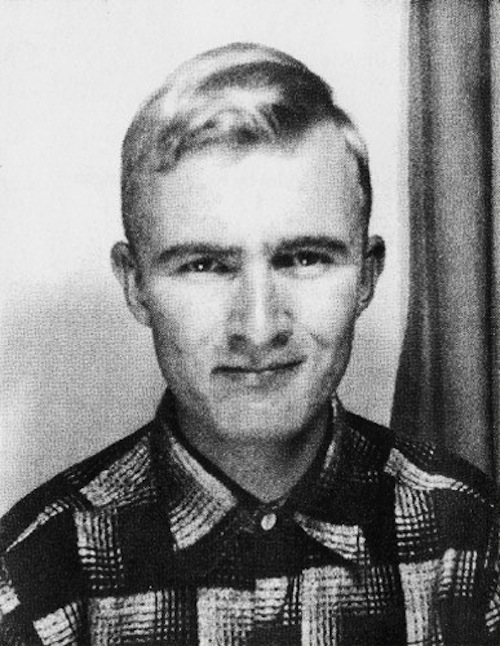
Jubilee Hitchhiker, the big biography of Richard Brautigan was published last April by Counterpoint Press, in Berkeley. William Hjortsberg, the author and a novelist himself, is also a character in the narrative, referring to himself in the third person. The biography covers the beginning of Richard's life in Tacoma, Washington, and up to and after his death at his home in Bolinas, California. The book contains extensive interviews, histories, and literary gossip of North Beach in the late 1950s during the time of the San Francisco Renaissance—through the Haight-Ashbury "hippie movement of the 1960"—through his trips to Japan—and to the community of writers and friends in Livingston, Montana, where he had bought a small ranch. The book is over 800 pages, edited down from 2,000 pages and over 20 years in the writing. There is an enormous amount of detail concerning Brautigan's everyday life with a complete bibliography of publications, books, and articles by and about Brautigan.
Hjortsberg begins and ends the book with a description of Brautigan's last day and of the act that puts a bullet that through his head. His suicide, like Hemingway's (who Richard considered his "literary father") may be one of the first things readers will remember about him: "There was a darkness growing, eating away inside him. The corrosion of pain and disappointment consumed the very last of Richard's dwindling supply of hope."
He'd set out to become a great American writer and believed he had achieved his goal… Brautigan walked soundlessly into the kitchen and turned up the volume on the radio… The pistol felt comfortable, fitting easily into his right hand… Brautigan thumbed back the hammer, cocking the big Smith and Wesson. No one will ever know his final thoughts.
At this point one wonders at Hjortsberg's restraint in filling in the reader—having permitted himself much access to Brautigan's thoughts and actions.
I first met Richard in 1957 with his buddy Ron Lowensohn at an opening at the East West Gallery in San Francisco. We were all young. I was 23, Richard was 22, and Ron was 20. I asked them who they read. Ron Lowensohn said Wordsworth. I scoffed at him. Richard invited me to dinner the next night. We went to Chinatown where you could get a good bowl of greens and rice for 35 cents. Richard said he was broke, so I paid. Ten years later we regularly met over the marked down meat at a local Safeway. Still watching pennies. Ten years after that he was really "well off." Seven years later he was broke again and gone from this earth.
After dinner in Chinatown, Richard took me to North Beach. I had been living on nearby Columbus Avenue, but somehow had not discovered Grant Avenue. We ran into Mike Nathan, a young painter who had a painting in City Lights window—a doleful policeman and priest stand side by side, kind of Ben Shahn style. Mike wants to show me the Anxious Asp bar. Richard who is "shy" lags behind. For the rest of the evening we pass each other on separate sides of the street.
We really didn't speak again for six years, until after I had returned in 1964 after four years in Japan. By then he had written his first novel, Trout Fishing in America, and published parts of it in the Evergreen Review, which I read while commuting on a bus Japan in 1963. I laughed so hard everyone on the bus looked at me. Its very free American range of humor was such a great and welcome counterbalance to the formality of Japanese manners and life. I wrote Richard how much I liked it. His writing had moved way beyond the kind of compressed surrealistic but almost precious poetry he was producing in the late 50s. By March 1962, when he finished writing Trout Fishing in America, he manifested a fabulous wacky almost calculated confidence. Although he was never a part of any literary establishment, he did have the friendship and attention of Jack Spicer in North Beach. They were both born on January 30, fellow Aquarians. Spicer gave him invaluable help with Trout Fishing, going over the manuscript as it emerged, talking with him about it. He considered it a great "poem." In a greatly beneficial act he also introduced him to his future publisher, Donald M. Allen. The book sold way over two millions copies eventually.
I like to remember this hopeful, fresh time in Richard's life, before he became really well known—the state of existence he was waiting for. "This may be the last phone call we'll have before I become famous," he would say. But it didn't happen right then, and we went on to pretend to ignore each other over the marked down Safeway meat, he gazing at the lamb chops with a somber appraising soulfulness.
Associated with the poets of the San Francisco Renaissance, poet Joanne Kyger studied philosophy and...
Read Full Biography

